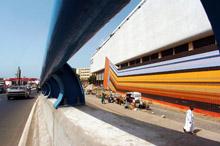
Typical street scene in Santa Ana, El Salvador. (Photo: iStock)
IMF Survey : Africa Enjoying Dynamic Growth but Challenges Remain
April 20, 2013
- Sound policies strengthened Africa’s growth despite difficult global environment
- Regional integration can boost growth, increase trade among African countries
- Africa to address remaining vulnerabilities including infrastructure, energy
African countries are focusing on improving their infrastructure and tackling unemployment to maintain their dynamic growth, said African finance ministers during the IMF-World Bank Spring Meetings in Washington.

Highway in Dakar, Senegal. Providing better infrastructure remains a challenge for many African countries (photo: Djibril Sy/Corbis)
IMF Spring Meetings
The ministers told reporters that, although Africa had weathered the crisis remarkably well, efforts needed to be undertaken to maintain solid, inclusive growth.
Noting that Europe, Africa’s traditional trading partner, was still grappling with weak growth, ministers called for more regional integration and greater trade among African countries to maintain dynamic growth in the continent.
Ministers also emphasized that Africa’s continued growth was based on sound policies, including prudent fiscal and monetary policy, adequate foreign reserves, and lower inflation.
They added that improving the business climate through more transparency and an easier access to information and statistics would facilitate the development of a strong private sector, which, in turn, would stimulate growth.
Nigeria’s Finance Minister Ngozi Okonjo-Iweala told the press briefing that Nigeria had seen growth of around 6 percent this year, as well as a decrease of inflation to single digits. She added that reserves in Nigeria were at $50 billion, providing an adequate buffer for the country.
Comoros’ Finance Minister Ali Soilihi said that despite a more difficult global environment and a year of unstable internal situation, growth in Comoros had picked up from 2.6 percent to 3 percent this year.
He credited an increase in activities in the construction sector, a good harvest, the resilience of remittances from expatriates, and significant internal contributions from the banking and financial sectors.
Filling the infrastructure and energy gaps
Despite this bright outlook, ministers noted that challenges in infrastructure and energy needed to be addressed. Cameroon’s Finance Minister Alamine Ousmane Mey underlined that better infrastructure was needed to develop more efficient industries.
“In the case of Cameroon, we are building better roads and ports, and following up on projects such as the Lom-Pangar dam to increase energy supplies in order to boost the creation of industrial centers,” said Mey.
He also added that creating better infrastructure would boost low-cost imports and exports, thus creating a strong domestic demand.
Okonjo-Iweala of Nigeria said that better roads and transport systems were crucial to achieve more regional integration.
Although South Sudan has been particularly affected by a severe lack of roads, the South Sudanese Minister Kosti Manibe Ngai pointed out that the government had taken steps to address the problem.
“We are planning on making major investments in infrastructure. We have plans to build a road that will start in Juba, and which will connect South Sudan to Uganda,” noted Ngai.
Stimulating employment
African countries still suffer from relatively high levels of unemployment, and particularly youth unemployment. Cameroon’s Minister Mey said that the issue of youth unemployment needed to be addressed by improving the business climate and facilitating the activities of the private sector.
“By improving the business climate, we can attract international and domestic investment that will create stable and long lasting jobs for our youth,” said Mey.
He also added that “the current emphasis on second generation agriculture is such that well educated young African populations can take advantage of this opportunity to find stable means of living, while producing enough foodstuffs for the region.”
Okonjo-Iweala pointed out that labor mobility was also a tool to ease unemployment. She urged African countries to create more labor enhancing policies that would facilitate the movement of skilled labor across countries.
Comoros’ Minister Soilihi stressed the importance of investments in education to create a well prepared labor force.
Improving security
Minister Kosti Manibe pointed out that, although there was insecurity in some regions of South Sudan, the country as a whole was safe. He added that the government would solve the remaining pockets of insecurities through sustained dialogue with the Yau Yau rebels.
Minister Mey noted that security and peace in the Central African Republic was also a priority for the countries of the Economic Community of Central African states (ECCA). He added that measures were underway to help the Central African Republic to return to stability.


